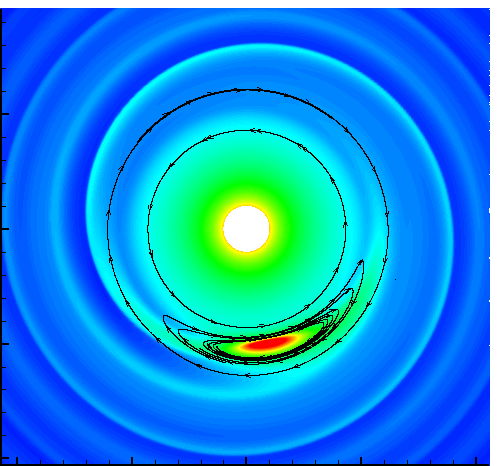|
Rossby Wave Instability
Rossby Wave Instability (RWI) is a concept related to astrophysical accretion discs. In non-self-gravitating discs, for example around newly forming stars, the instability can be triggered by an axisymmetric bump, at some radius r_0, in the disc surface mass-density. It gives rise to exponentially growing non-axisymmetric perturbation in the vicinity of r_0 consisting of anticyclonic vortices. These vortices are regions of high pressure and consequently act to trap dust particles which in turn can facilitate planetesimal growth in proto-planetary discs. The Rossby vortices in the discs around stars and black holes may cause the observed quasi-periodic modulations of the disc's thermal emission. Rossby waves, named after Carl-Gustaf Arvid Rossby, are important in planetary atmospheres and oceans and are also known as planetary waves. These waves have a significant role in the transport of heat from equatorial to polar regions of the Earth. They may have a role in the formation of ... [...More Info...] [...Related Items...] OR: [Wikipedia] [Google] [Baidu] |
Rossby Wave Instability In A Keplerian Disk
Carl-Gustaf Arvid Rossby ( 28 December 1898 – 19 August 1957) was a Sweden, Swedish-born American meteorologist who first explained the large-scale motions of the Earth's atmosphere, atmosphere in terms of fluid mechanics. He identified and characterized both the jet stream and the long waves in the westerlies that were later named Rossby waves. Biography Carl-Gustaf Rossby was born in Stockholm, Sweden. He was the first of five children born to Arvid and Alma Charlotta (Marelius) Rossby. He attended Stockholm University, where he developed his first interest in mathematical physics. Rossby came into meteorology and oceanography while studying geophysics under Vilhelm Bjerknes at the Geophysical Institute, University of Bergen in Bergen, Norway, during 1919, where Bjerknes' group was developing the groundbreaking concepts that became known as the Bergen School of Meteorology, including theory of the polar front. He also studied at the University of Leipzig and at the Linde ... [...More Info...] [...Related Items...] OR: [Wikipedia] [Google] [Baidu] |

